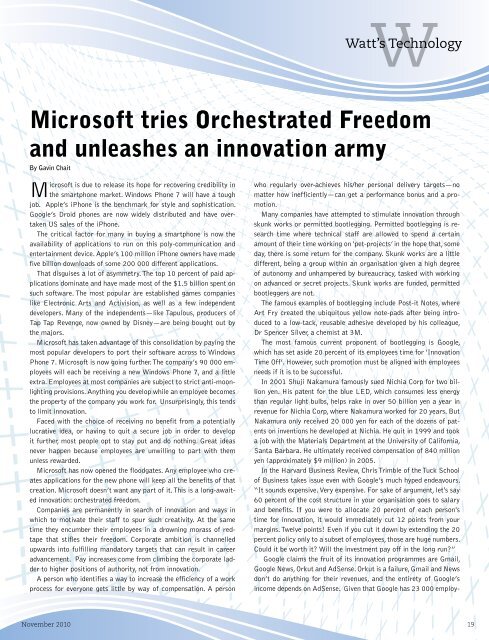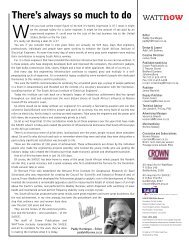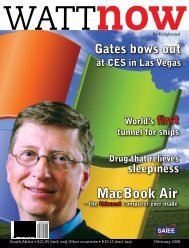download a PDF of the full November 2010 issue - Wattnow
download a PDF of the full November 2010 issue - Wattnow
download a PDF of the full November 2010 issue - Wattnow
You also want an ePaper? Increase the reach of your titles
YUMPU automatically turns print PDFs into web optimized ePapers that Google loves.
W<br />
Watt’s Technology<br />
Micros<strong>of</strong>t tries Orchestrated Freedom<br />
and unleashes an innovation army<br />
By Gavin Chait<br />
Micros<strong>of</strong>t is due to release its hope for recovering credibility in<br />
<strong>the</strong> smartphone market. Windows Phone 7 will have a tough<br />
job. Apple’s iPhone is <strong>the</strong> benchmark for style and sophistication.<br />
Google’s Droid phones are now widely distributed and have overtaken<br />
US sales <strong>of</strong> <strong>the</strong> iPhone.<br />
The critical factor for many in buying a smartphone is now <strong>the</strong><br />
availability <strong>of</strong> applications to run on this poly-communication and<br />
entertainment device. Apple’s 100 million iPhone owners have made<br />
five billion <strong>download</strong>s <strong>of</strong> some 200 000 different applications.<br />
That disguises a lot <strong>of</strong> asymmetry. The top 10 percent <strong>of</strong> paid applications<br />
dominate and have made most <strong>of</strong> <strong>the</strong> $1.5 billion spent on<br />
such s<strong>of</strong>tware. The most popular are established games companies<br />
like Electronic Arts and Activision, as well as a few independent<br />
developers. Many <strong>of</strong> <strong>the</strong> independents—like Tapulous, producers <strong>of</strong><br />
Tap Tap Revenge, now owned by Disney—are being bought out by<br />
<strong>the</strong> majors.<br />
Micros<strong>of</strong>t has taken advantage <strong>of</strong> this consolidation by paying <strong>the</strong><br />
most popular developers to port <strong>the</strong>ir s<strong>of</strong>tware across to Windows<br />
Phone 7. Micros<strong>of</strong>t is now going fur<strong>the</strong>r. The company’s 90 000 employees<br />
will each be receiving a new Windows Phone 7, and a little<br />
extra. Employees at most companies are subject to strict anti-moonlighting<br />
provisions. Anything you develop while an employee becomes<br />
<strong>the</strong> property <strong>of</strong> <strong>the</strong> company you work for. Unsurprisingly, this tends<br />
to limit innovation.<br />
Faced with <strong>the</strong> choice <strong>of</strong> receiving no benefit from a potentially<br />
lucrative idea, or having to quit a secure job in order to develop<br />
it fur<strong>the</strong>r, most people opt to stay put and do nothing. Great ideas<br />
never happen because employees are unwilling to part with <strong>the</strong>m<br />
unless rewarded.<br />
Micros<strong>of</strong>t has now opened <strong>the</strong> floodgates. Any employee who creates<br />
applications for <strong>the</strong> new phone will keep all <strong>the</strong> benefits <strong>of</strong> that<br />
creation. Micros<strong>of</strong>t doesn’t want any part <strong>of</strong> it. This is a long-awaited<br />
innovation: orchestrated freedom.<br />
Companies are permanently in search <strong>of</strong> innovation and ways in<br />
which to motivate <strong>the</strong>ir staff to spur such creativity. At <strong>the</strong> same<br />
time <strong>the</strong>y encumber <strong>the</strong>ir employees in a drowning morass <strong>of</strong> redtape<br />
that stifles <strong>the</strong>ir freedom. Corporate ambition is channelled<br />
upwards into fulfilling mandatory targets that can result in career<br />
advancement. Pay increases come from climbing <strong>the</strong> corporate ladder<br />
to higher positions <strong>of</strong> authority, not from innovation.<br />
A person who identifies a way to increase <strong>the</strong> efficiency <strong>of</strong> a work<br />
process for everyone gets little by way <strong>of</strong> compensation. A person<br />
who regularly over-achieves his/her personal delivery targets—no<br />
matter how inefficiently—can get a performance bonus and a promotion.<br />
Many companies have attempted to stimulate innovation through<br />
skunk works or permitted bootlegging. Permitted bootlegging is research<br />
time where technical staff are allowed to spend a certain<br />
amount <strong>of</strong> <strong>the</strong>ir time working on ‘pet-projects’ in <strong>the</strong> hope that, some<br />
day, <strong>the</strong>re is some return for <strong>the</strong> company. Skunk works are a little<br />
different, being a group within an organisation given a high degree<br />
<strong>of</strong> autonomy and unhampered by bureaucracy, tasked with working<br />
on advanced or secret projects. Skunk works are funded, permitted<br />
bootleggers are not.<br />
The famous examples <strong>of</strong> bootlegging include Post-it Notes, where<br />
Art Fry created <strong>the</strong> ubiquitous yellow note-pads after being introduced<br />
to a low-tack, reusable adhesive developed by his colleague,<br />
Dr Spencer Silver, a chemist at 3M.<br />
The most famous current proponent <strong>of</strong> bootlegging is Google,<br />
which has set aside 20 percent <strong>of</strong> its employees time for ‘Innovation<br />
Time Off’. However, such promotion must be aligned with employees<br />
needs if it is to be successful.<br />
In 2001 Shuji Nakamura famously sued Nichia Corp for two billion<br />
yen. His patent for <strong>the</strong> blue LED, which consumes less energy<br />
than regular light bulbs, helps rake in over 50 billion yen a year in<br />
revenue for Nichia Corp, where Nakamura worked for 20 years. But<br />
Nakamura only received 20 000 yen for each <strong>of</strong> <strong>the</strong> dozens <strong>of</strong> patents<br />
on inventions he developed at Nichia. He quit in 1999 and took<br />
a job with <strong>the</strong> Materials Department at <strong>the</strong> University <strong>of</strong> California,<br />
Santa Barbara. He ultimately received compensation <strong>of</strong> 840 million<br />
yen (approximately $9 million) in 2005.<br />
In <strong>the</strong> Harvard Business Review, Chris Trimble <strong>of</strong> <strong>the</strong> Tuck School<br />
<strong>of</strong> Business takes <strong>issue</strong> even with Google’s much hyped endeavours.<br />
“It sounds expensive. Very expensive. For sake <strong>of</strong> argument, let's say<br />
60 percent <strong>of</strong> <strong>the</strong> cost structure in your organisation goes to salary<br />
and benefits. If you were to allocate 20 percent <strong>of</strong> each person's<br />
time for innovation, it would immediately cut 12 points from your<br />
margins. Twelve points! Even if you cut it down by extending <strong>the</strong> 20<br />
percent policy only to a subset <strong>of</strong> employees, those are huge numbers.<br />
Could it be worth it Will <strong>the</strong> investment pay <strong>of</strong>f in <strong>the</strong> long run”<br />
Google claims <strong>the</strong> fruit <strong>of</strong> its innovation programmes are Gmail,<br />
Google News, Orkut and AdSense. Orkut is a failure, Gmail and News<br />
don’t do anything for <strong>the</strong>ir revenues, and <strong>the</strong> entirety <strong>of</strong> Google’s<br />
income depends on AdSense. Given that Google has 23 000 employ-<br />
<strong>November</strong> <strong>2010</strong> 19

















